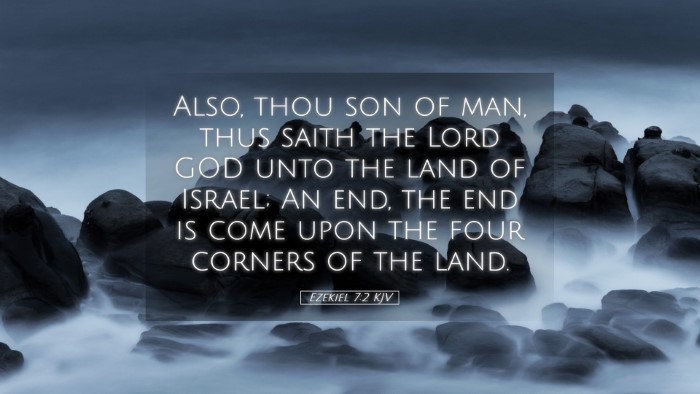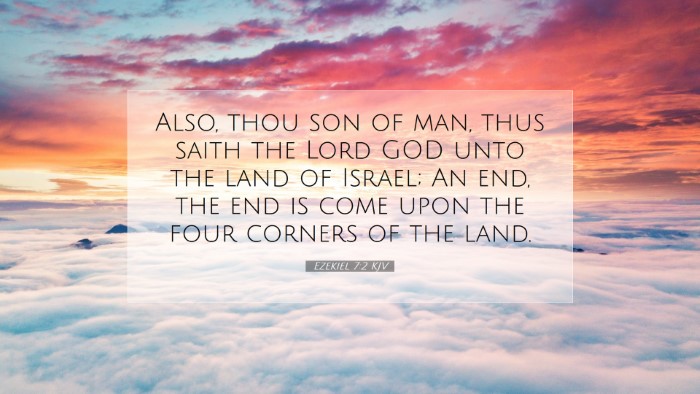Ezekiel 7:2 - Commentary and Insights
Ezekiel 7:2 states, "Also, you son of man, thus says the Lord God to the land of Israel: 'An end! The end has come upon the four corners of the land!' This proclamation heralds a significant moment in prophetic history, marking the climax of divine judgment upon Israel. The following commentary synthesizes insights from notable public domain commentaries, providing a comprehensive examination of this verse.
Contextual Background
The book of Ezekiel, authored by the prophet Ezekiel during the Babylonian exile, is characterized by vivid imagery and profound theological insights regarding judgment, restoration, and God’s sovereignty. This specific chapter conveys the sobering message of impending doom due to Israel's persistent rebellion against God.
Key Themes
- The Certainty of Judgment: The phrase "the end has come" signals a definitive closure to God’s patience and grace. As noted by Matthew Henry, God’s judgments are always just and reflect His holiness. Ezekiel's message is meant to awaken the hearts of the people to their sinful state and the consequences that follow.
- Geographical Significance: The mention of “the four corners of the land” suggests a thorough and comprehensive judgment affecting the entire nation. Albert Barnes emphasizes that this signifies no part of Israel will escape God’s righteous retribution, serving as a reminder of the omnipresence of divine authority.
- The Role of the Prophet: Ezekiel, as “the son of man,” embodies the voice of God, calling the people to repentance while also declaring inevitable judgment. Adam Clarke points out the responsibility of the prophet to deliver God’s messages faithfully, even when they are difficult or unpopular.
Theological Implications
The implications of this verse extend beyond its immediate context and resonate with core theological principles:
- God’s Sovereignty: The declaration of an “end” reflects God’s ultimate control over history and nations. He is portrayed as the sovereign ruler who executes judgment with authority, as articulated by Matthew Henry.
- Human Accountability: Israel’s state of disobedience underscores the responsibility of God’s people to adhere to His commands. This theme of accountability is prominent in biblical prophecy, reminding believers of the seriousness of sin and the necessity of repentance.
- Hope Amidst Judgment: While the declaration of judgment is severe, the overarching narrative of Ezekiel includes themes of restoration and hope for future redemption, inviting reflection on God’s mercy even in the face of justice.
Practical Applications
For pastors, students, and scholars, Ezekiel 7:2 serves as a catalyst for deeper theological reflection and practical applications:
- Emphasis on Repentance: Just as Ezekiel called Israel to acknowledge their sin, modern believers are challenged to engage in self-examination and repentance, ensuring that their lives align with God's desires.
- Understanding Divine Justice: The certainty of God’s judgment invites an exploration of the nature of justice within the biblical narrative. It compels the faithful to consider how they communicate God’s justice in their ministries.
- Courage to Proclaim Truth: Ezekiel’s role as a messenger encourages present-day believers to proclaim the truth of God’s Word faithfully, understanding that their message may not always be received positively.
Conclusion
Ezekiel 7:2 stands as a poignant reminder of God’s sovereignty, the gravity of sin, and the profound implications of prophetic declarations. Insights from Matthew Henry, Albert Barnes, and Adam Clarke collectively enrich our understanding, encouraging faithful adherence to God’s Word. As we contemplate this verse, let us be inspired to engage in heartfelt repentance, proclaim God's truth, and remain steadfast in the hope of His restoration.


